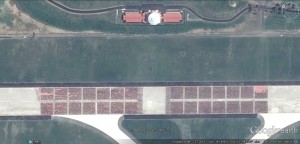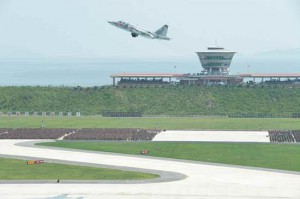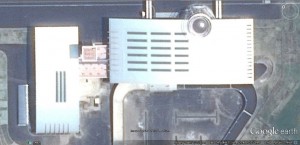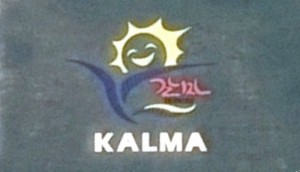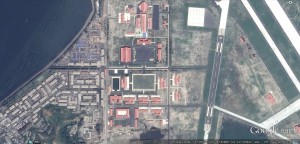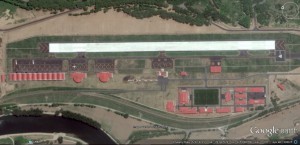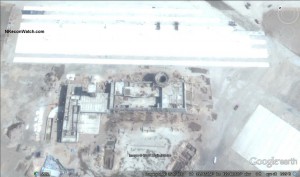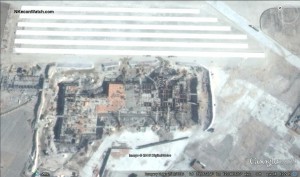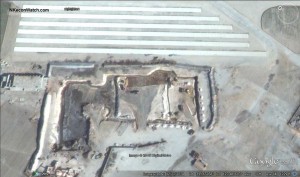UPDATE 2 (2015-10-23): The Institute for Far Eastern Studies (IFES) reports on additional developments in the DPRK’s insurance industry:
North Korean Insurance Company to Expand Insurance Offerings
On October 14, 2015, the state-owned North Korean insurance company, Korean National Insurance Corporation (KNIC), promoted its ongoing insurance programs at the Kaesong Industrial Complex, revealing that it will offer more types of insurance if North-South economic cooperation expands in the future.
As North Korea’s market economy has expanded under the Kim Jong Un regime, insurance aimed at the ‘protection of assets’ has also increased.
“In order to actively ensure joint economic development projects between the North and South using the economic space of insurance, in 2005 we started insuring the assets of businessmen from the South who come to the Kaesong Industrial Region,” KNIC announced on its homepage on October 14.
The company explained, “The types of insurance currently implemented are fire insurance, car insurance, and gas accident liability insurance […] In the future several insurance sectors will grow further commensurate with the increasing variety and expansion of North-South economic cooperation projects.”
The company emphasized that in the future it will offer insurance programs more practical for South Korean businesses at the Kaesong Industrial Complex.
KNIC has also recently introduced new insurance products covering things like cell phones and fruit orchards.
However, Kaesong companies have reportedly not been enthusiastic about the products offered by KNIC. Not only is it difficult to trust the ability of North Korean insurance companies to pay out insurance money in the case of an insurance claim, but the insurance money itself is small. As a result, South Korean companies at Kaesong have been reluctant to enroll.
Meanwhile, KNIC revealed that it is strengthening its fire insurance services in accordance with North Korea’s recent construction of a number of new buildings such as the Masikryong Ski Resort, the Mirim Horse Riding Club, and the Pyongyang Sunan International Airport terminal.
“As we work to realize fire insurance guarantees of newly built or remodeled buildings in a timely manner, we are ensuring that insured companies are equipped with fire alarms and fire extinguishing facilities and experience improvements in risk management,” the insurance company declared.
It added, “We are also bringing in internationally recognized appraisal companies along with domestic appraisers to make sure that risk assessments of new insurance subjects proceed normally on-site.”
UPDATE 1 (2015-8-20): The Institute for Far Eastern Studies (IFES) reports on developments in the DPRK’s insurance market:
New Insurance Products Appearing in North Korea
All sorts of insurance products, such as cell phone insurance and insurance against damage to fruit farms, are starting to appear in North Korea.
The Korea National Insurance Corporation (the state insurance company representing North Korea), revealed on its website on August 12, 2015 that the issue of cell phone insurance was discussed at the annual general meeting of provincial governors held in Pyongyang in February 2015.
“At last year’s meeting, provincial governors from all over, including Pyongyang, North Hamgyong Province, Yanggang Province, and Jagang Province, met and introduced new areas of business such as cell phone insurance. They discussed increasing the number of insurance policy holders and expanding coverage to raise insurance premium revenue,” the insurance company reported.
Recently, as the number of cell phone owners shoots up, the instances of lost or damaged phones have also risen. It appears that this new form of insurance is being offered against this backdrop to compensate cell phone owners for such incidents. As in South Korea, it is not yet mandatory for North Korean cell phone owners to purchase cell phone insurance.
Currently, North Korea’s primary mobile carrier, the Egyptian firm Orascom, owns a 75% share in North Korea’s mobile communications company Koryo Link. As of the end of June 2014, the company had 2.4 million cell phone subscribers in North Korea.
The Korea National Insurance Corporation is also preparing to offer insurance for fruit trees in order to compensate owners of fruit farms for damage caused by natural disasters or other events.
The company explained the background behind offering this insurance product on their homepage. According to the website, since Kim Jong Un came to power, a lot of effort has been put into the development of agriculture and fruit farms, but due to recent abnormal climate phenomena like El Niño, these fields have experienced a lot of difficulties.
The website reveals, “Based on experience accumulated in the testing phase, we plan on offering insurance coverage within several years for modern, large-scale fruit farms like Taedong River Integrated Fruit Farm and Kangwon Province’s Kosan Fruit Farm.”
In order to do this, the company has been performing risk appraisals since 2013 with international damage appraisers for each of the fruit farms. This suggests that it is keeping foreign reinsurance companies and contracts in mind.
The company offers fruit farms insurance coverage for a variety of calamities and natural disasters. It covers fruit trees in the event of drought, landslides, or fire; fruit in the event of hail, drought, excessive moisture, extreme heat, or fire; and the quality of fruit in the event of hail, heavy rain, or storms.
The provision of insurance for fruit farms is seen as an extension of North Korea’s ongoing efforts to earn foreign currency through insurance companies.
The fact that various insurance products are appearing in North Korea has attracted attention in the context of North Korea’s recent economic developments. Since Kim Jong Un came to power, the regime has tried to recognize and protect private property as the market economy has expanded through the growth of companies’ independent management rights and the expansion of private profits. Especially in the case of insurance companies, it is believed that the regime is trying to maximize profits by generating additional income through insurance premiums.
ORIGINAL POST (2015-8-17): Elizabeth Shim reports the following at UPI:
On Tuesday, Pyongyang’s Korea National Insurance Corp. posted on its website information on annual meetings held in each province. Issues of mobile phone insurance were discussed during the meetings, South Korean news agency Yonhap reported.
The North Korean insurance firm said in statement that new businesses were being introduced to meet the increased demand for mobile phone insurance in Pyongyang and the provinces, South Korean television network SBS reported.
The mobile phone is becoming a central component of everyday life for many North Koreans, particularly for merchants who are on the road to sell wares around the country – but damage or loss of phones are raising the demand for insurance in the country.
Egyptian firm Orascom owns a 75 percent stake in North Korea’s main network, Koryolink, and offers services to 2.4 million North Koreans.
Other insurance mentioned include new policies for agriculture and protection plans for large-scale fruit farms by the Taedong River and in Kangwon province are being assembled, according to North Korea. The plans would provide protection against weather effects like “El Nino,” that is resulting in increased drought, torrential rain, high temperatures and other factors that are hurting crops.
The Korea National Insurance Corporation web page is here. Here are the two specific reports mentioned in the article:
Annual conference of provincial KNIC branches held
The annual conference of provincial branches of Korea National Insurance Corporation was held in Pyongyang on February 25th and 26th.
It was attended by head-office officials concerned and branch managers, and accountants thereof, of different provinces.
Its agenda involved review of last year’s insurance operations conducted by the provincial branches, and determination of their goals to be reached this year.
Great appreciation was shown in the conference for the branches including the ones in Pyongyang, North Hamgyong Province, Ryanggang and Jagang Provinces, all of which, last year, introduced new insurance products, like mobile phone insurance, into sale, and brought an increase in the number of the insureds and objects to result a rise in premium income, and made prompt indemnifications on a scientific basis thus contributing to the stabilization of operation, production of the insureds concerned and people’s lives, as well.
Stress was laid on adoption and development of effective business strategies plus further improvement and intensification of insurance operation upholding the slogan reading “ Let us all turn out in the general offensive to hasten final victory in the revolutionary spirit of Paektu!”, thus enhancing the role of insurance in line with the development of national economy and improvement of the livelihood of the people as befitting the significance of the year marking the 70th founding anniversary of the Workers’ Party of Korea.
Lectures were given on business practices involving accountancy and some insurance accounts during the conference.
Fruit Crop Insurance to be introduced in future
According to a far-reaching plan of Chairman Kim Jong Il and supreme leader Kim Jong Un to supply the people with fresh fruit in and out of season, Taedonggang Combined Fruit Farm had been built as the best integrated base for fruit production, keeping production going on a high level, and furthermore, Kosan Fruit Farm has been expanded as a large-scale fruit farm with the introduction of scientific, intensive and modernized methods into fruit production.
At present, the farms have boosted production by applying the densely planting method of dwarf fruit trees following the world-wide trend of fruit farming development and growing several kinds of fruit trees including high-grade apple, pear and peach as befits the specific conditions of our country.
They grow apple trees of Korean original varieties such as Hwangju, Pukchong and Unryul together with dwarf apple trees of more than a hundred of varieties including Granny Smith, Fuji and Golden Delicious,and meet their own demand for young saplings by growing them on their own.
However, there have frequently occurred abnormal weather phenomena due to El Nino in recent years, causing negative effects on agriculture and fruit farming in our country and its surrounding countries.
As far as fruit farming is so greatly influenced by the nature and terrain and weather conditions as agriculture, Korea National Insurance Corporation (KNIC) has intention of newly underwriting insurance contracts with fruit farms in our country so as to put production on a normal basis under the adverse weather conditions recently occurred.
The subject matter insured under Fruit Crop Insurance shall be fruit and fruit trees cultivated by fruit farms in DPRK, and the covered risks are as follows;
– Yield Loss Coverage
Drought, freezing, landslide, fire,
– Fruit Tree Loss Coverage
Hail, drought, excessive moisture, extreme heat, fire,
– Quality Loss Coverage
Hail, torrential rainfall and windstorm.
In 2013, KNIC conducted a risk survey on some fruit farms in our country in cooperation with international loss adjusters, and since then KNIC has underwritten insurance contracts with those farms.
KNIC, on the basis of practical experience gained at that pilot stage, shall cover against the risks mentioned above modernized and large-scale fruit farms including Taedonggang Combined Fruit Farm and Kosan Fruit Farm within a few years to come.
Although KNIC has a dubious history, today the group still posts regular financial information which (if accurate) would make it one of the most financially transparent organizations in the DPRK (Congrats to them for at least trying). See tables here, here, and here.
Previous posts on the Korean National Insurance Corporation here.
Once they figure out crop insurance, the next step should be a commodity futures market!
Read the full UPI story here:
North Korea to provide insurance for drought, lost phones
UPI
Elizabeth Shim
2015-8-12

